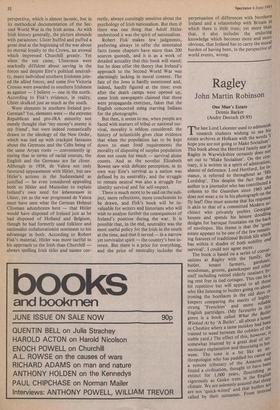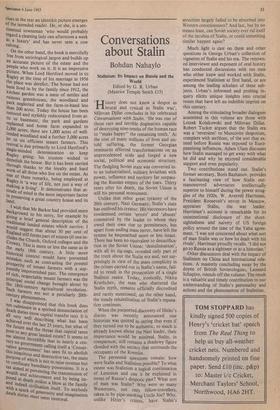Ragley
John Martin Robinson
One Man's Estate Dennis Barker (Andre Deutsch £9.95)
re late Lord Leicester used to admonish research students wishing to see his estate archives at Holkam with the words 'I hope you are not going to Make Socialism'. This book about the Hertford family seat in
i
Ragley in Warwickshire certainly does not set out to 'Make Socialism'. On the con- trary, it is written in a spirit of admiration, almost of deference. Lord Hertford, for in
stance, is referred to throughout as 'His Lordship'. This despite the fact that the
author is a journalist who has contributed a column to the Guardian since 1963 and does not wear a tie in his photograph on the fly leaf! One must assume that his response is akin to that of a committed Modern ar- chitect who privately prefers Georgian houses and spends his leisure doodling designs for baroque fountains on the back of envelopes. His theme is that the `gre.ant estate appears to be one of the few remai- ing features of traditional British life which has within it shades of both nobility and survival'. I could not agree more. The book is based on a series of conver- sations at Ragley with the family, the butler, tenant farmers, gardener, woodsman, groom, gamekeeper and other staff including retired elderly retainers liv- ing rent free in tied cottages. This can be a bit repetitive but will appeal to all those who like listening to butlers going on about ironing the bootlaces in the old days or keepers comparing the merits of highlY- strung `Frenchies and more reliable English partridges. (My favourite in this genre is a book called What the Butler Winked At by 'A Butler', all about a house in Cheshire where a tame monkey had been trained to weed between the cobbles of the i stable yard.) The effect of this, however, s somewhat blunted by a great deal of nr!: necessary explanation and theorising in he', ween. The tone is a bit like an an- thropologist who has paddled his canoe up a remote tributary of the Amazon be n found a civilisation, thought to have b extinct for 1,000 years, flourishing as vigorously as Ginko trees in the English climate. We are solemnly assured that sheepe are not 'quick-witted' and that butlers ar_ called by their surnames. From internoi clues in the text an identikit picture emerges i of the intended reader. He, or she, is a sen- timental townsman 'who would probably regard a cleaning lady one afternoon a week as a luxury' and has never seen a cow calving.
On the other hand, the book is mercifully free from sociological jargon and builds up an accurate picture of the estate and the People who work on it. It is an impressive picture. When Lord Hertford moved in to Ragley at the time of his marriage in 1956 the place was derelict. The house had not been lived in by the family since 1912, the kitchen garden was a mess of nettles and ruinous greenhouses, the woodland and Park neglected and the farm-in-hand less than 200 acres. Today the house has been restored and stylishly redecorated from at- tic to basement, the park and gardens replanted and home farm expanded to 2,000 acres; there are 1,000 acres of well- tended woodland and a further 3,000 acres let to six efficient tenant farmers. This revival is due primarily to Lord Hertford's single-minded determination to keep Ragley going; his trustees wishedto demolish the house. But it has been carried through thanks to the loyalty and hard work of all those who live on the estate. As one of them remarks, being employed at Ragley is 'a way of life, not just a way of making a living'. It demonstrates that at- titude of mind is the most important factor nt Preserving a great country house and its land.
I wish that Mr Barker had provided more background to his story, for example by gmu8 a brief general description of the traditional landed estates which survive. I would suggest that about 50 per cent of
in- cludes still forms part of estates (if one n- cludes the Church, Oxford colleges and the Creiwn). This is more or less the same as in the early 18th century. A little more historical context would have prevented mistakes such as contrasting the present prosperity of tenant farmers with a sup- posedly impoverished past. The emergence of rich, respectable tenant farmers was the principal social change brought about by the 18th-century agricultural revolution. Such farmers are not a peculiarly 20th- century phenomenon. I was disappointed that this book does not culminate in a spirited denunciation of death duties (now capital transfer tax). It is all very well describing what has been achieved over the last 25 years, but what of the future and the threat that capital taxes pose to any great landed estate? It seems to me almost incredible that in nearly a cen- tury no government calling itself a 'Conser- vative government' has seen fit to abolish this iniquitous and destructive tax, the main Purpose of which is not to raise revenue but to confiscate hereditary possessions. It is a tax aimed at preventing the transmission of wealth and achievement and by being im- posed at death strikes a blow at the family
indeed ndeed civilisation itself. To anybody with a spark of generosity and imagination death duties must seem immoral.















































 Previous page
Previous page